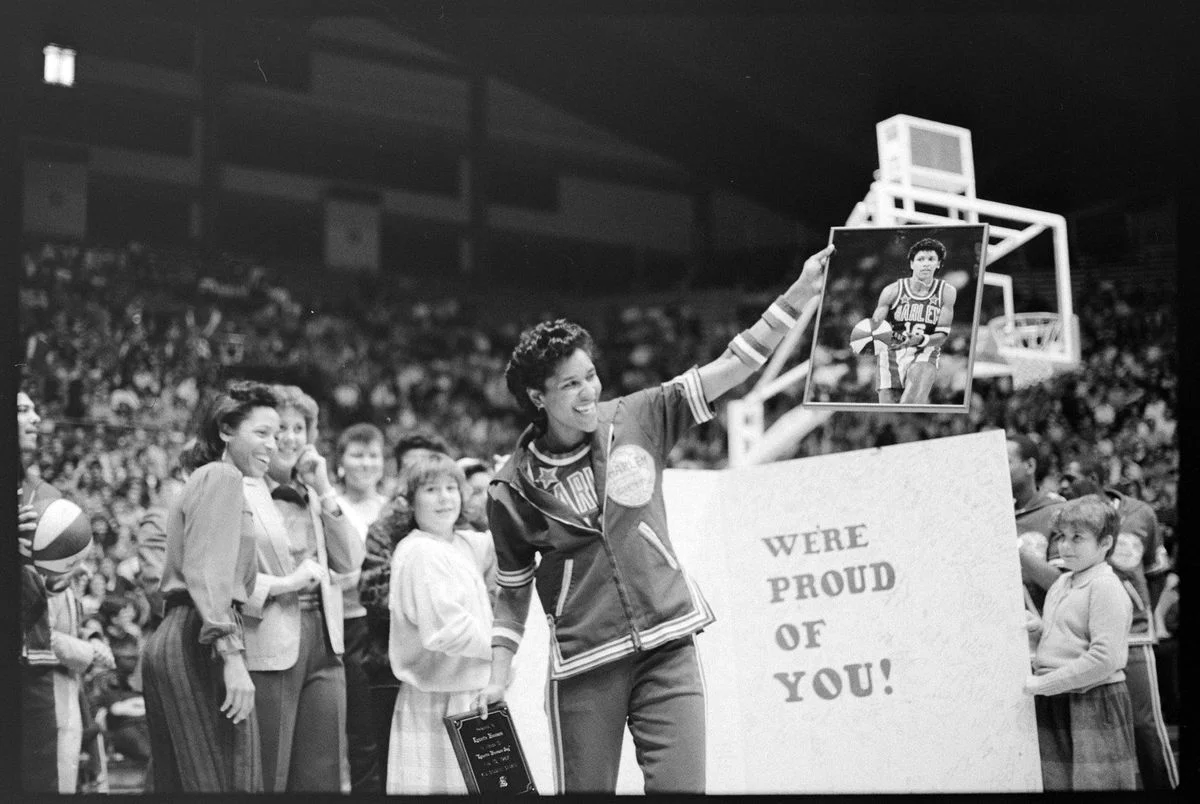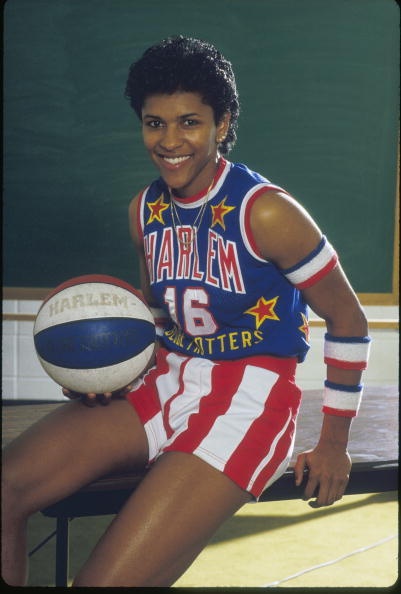For just a minute, conjure up the song “Sweet Georgia Brown” in your head. Now, think about the Harlem Globetrotters and their magic circle warm up routine. That’s where we’re going to start this story.
The Globetrotters have always been innovators. But perhaps their greatest innovation was in 1985, when they signed a woman, the first woman to ever play professionally with men. That woman was from Kansas, and she would not only change the game but become a hero to female athletes and probably many other young women.
Even the most casual basketball fan can tick off famous Jayhawks: Wilt Chamberlain, Jo Jo White, coaches Phog Allen and Bill Self and, of course, the inventor of the game, James Naismith, who we covered on a previous Archiver. But the one who scored more points, blazed more trails and probably inspired more athletes was Lynette Woodard.
In her four years at KU, she scored 3,649 points, more than any other woman in the game, and she scored all those points at a time when there wasn’t a three point shot. How does that stack up against the men? Well, the man with the most points at KU, Danny Manning, had 2,951. That’s 698 fewer points than Lynette. Put another way, Manning would have had to play 35 more games, an entire other season, to match Woodard’s scoring.
What else you say? How about a four time All America. Twice an Olympian and in 1996, she was named the greatest female athlete ever in the old Big Eight. Make no mistake, Woodard joining the Globetrotters was a big deal.
Ebony Magazine called her the Crown Princess of Basketball, a play on the Trotters famous marketing line. This is what the Philadelphia Daily News wrote about her after a game in Houston on February 14th, 1986.
“Doe-fleet and willow-tall, 26 year old Woodard is blazing a trail in basketball. She won’t rival Jackie Robinson, but that’s OK. Woodard is not comfortable being thought of as a role model.”
But, it turns out, one doesn’t seek role model status...it finds you. And it certainly found Lynette Woodard.
I needed to know more about not just Lynette the basketball player but Lynette the role model. So, I went to Mechelle Voepel who writes about women’s sports for ESPN.com.
I covered Lynette at the student radio station at KU and even played in some pick up games with her. I think Lynette Woodard as a player was uncomplicated, versatile to be sure, but not complicated. As a person, very complicated and not too well known.
“She’s one of the all time greatest athletes in women’s sports. I’m not sure there are any greater advocates than guys, including some who I worked with at the Kansas City Star, who played against her,” says Voepel. “I just saw her earlier this year at the women’s basketball Hall of Fame and I was so glad to see her and say hi to her. Do I feel like I really, really know her as a person? I would say no. I revere what she meant to the sport and always want to talk about it because it’s not talked about. But who Lynette is as a person, maybe someday she’ll write a book or tell her story about who she is.”
Woodard bounced around a bit. Sometimes deep into basketball. Sometimes away altogether. She played for the Globetrotters for two years, played in both Italy and Japan, worked as a Wall Street stockbroker and would return to coach briefly at KU. She was athletic director in the Kansas City Missouri public schools and played two seasons in the WNBA.
In 2004, she was inducted into the Basketball Hall of Fame.
Lynette also reminded me of another Kansan, another basketball trailblazer we talked about on Archiver; Coach John McLendon. He was the first black person to graduate with a physical education degree from KU, the first black coach in professional basketball and a man who changed the game and paved the way for African American players.
Woodard and McLendon both quietly changed basketball and, along the way, inspired countless young men and women. Lynette Woodard is back where she belongs, in college basketball. She was named head coach of Winthrop University’s women’s basketball program last year.
Our theme music is used in this episode is Shy Touches by Nameless Dancers. Other music used in this episode is Manele, Milkwood, City Limits by Blue Dot Sessions; both have been edited.






